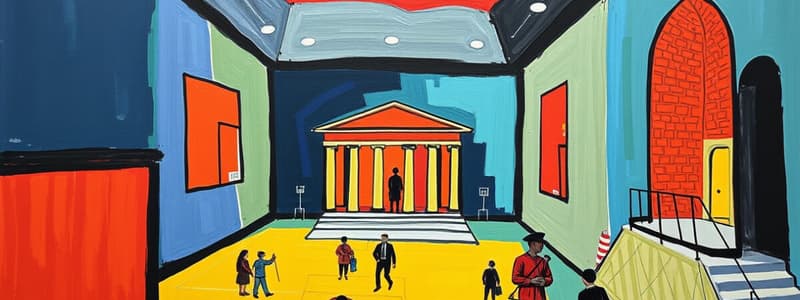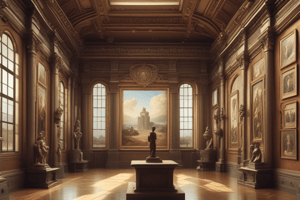Podcast
Questions and Answers
What was the primary focus of early museums during the Renaissance period?
What was the primary focus of early museums during the Renaissance period?
- The preservation of cultural artifacts for future generations
- The collection of religious artifacts for spiritual study
- A place for artistic performances and exhibitions
- A systematic and scientific methodology to understand nature, culture, and society (correct)
Which museum is considered one of the first, established in Alexandria, Egypt?
Which museum is considered one of the first, established in Alexandria, Egypt?
- The Museum of Alexandria (correct)
- The Ashmolean
- The British Museum
- The Louvre
How did museums evolve in the 17th and 18th centuries?
How did museums evolve in the 17th and 18th centuries?
- They were exclusively private collections maintained by wealthy families
- They became centers of artistic performances
- They developed as public institutions accessible to everyone (correct)
- They focused solely on natural history and biology
What significant change occurred in the role of museums in the 20th and 21st centuries?
What significant change occurred in the role of museums in the 20th and 21st centuries?
Which aspect was emphasized by museums as part of a country’s identity during the 17th and 18th centuries?
Which aspect was emphasized by museums as part of a country’s identity during the 17th and 18th centuries?
What major shift occurred in the role of museums after globalization?
What major shift occurred in the role of museums after globalization?
Which statement best describes what a museum is?
Which statement best describes what a museum is?
Historically, where did the concept of museums primarily originate?
Historically, where did the concept of museums primarily originate?
What unique contribution do museums make to society?
What unique contribution do museums make to society?
How has the definition of museums expanded beyond traditional roles?
How has the definition of museums expanded beyond traditional roles?
Flashcards are hidden until you start studying
Study Notes
Definition of a Museum
- A museum is a building housing objects of historical, scientific, artistic, or cultural value.
- Evolved from static displays to centers of education, research, interaction, and conservation post-globalization.
- Functions as a non-profit, permanent institution serving society to acquire, conserve, research, communicate, and exhibit heritage.
Historical Context
- Museums originated in Europe and parts of North Africa, notably Alexandria, Egypt.
- Initially focused on physical artifacts; later influenced by colonial expansion to other regions.
- In Southern Africa, museums aimed to study and collect local nature and culture for better control by colonial powers.
Development of Museums
- Early museums, known as "Cabinets of Curiosities," collected unique items for monetary value by wealthy families.
- The Renaissance (14th to 16th century) stimulated interest in arts and sciences, particularly in Florence, Italy.
- The Medici family's collection became a center for scholarly study and knowledge.
Evolution Through Centuries
- 17th/18th centuries saw museums develop into public institutions accessible to all.
- Shift to "national institutions" with large collections, like the Ashmolean in England and the Louvre in France.
- In the 20th/21st centuries, museums diversified with a focus on community engagement and public service.
Modern Museum Functions
- Museums safeguard and preserve cultural heritage, conducting scientific studies to understand the significance of artifacts.
- Foster social cohesion by assigning value to tangible traces of the past.
- Shift towards addressing topical issues and facilitating experiences rather than solely object-based collections.
Studying That Suits You
Use AI to generate personalized quizzes and flashcards to suit your learning preferences.



